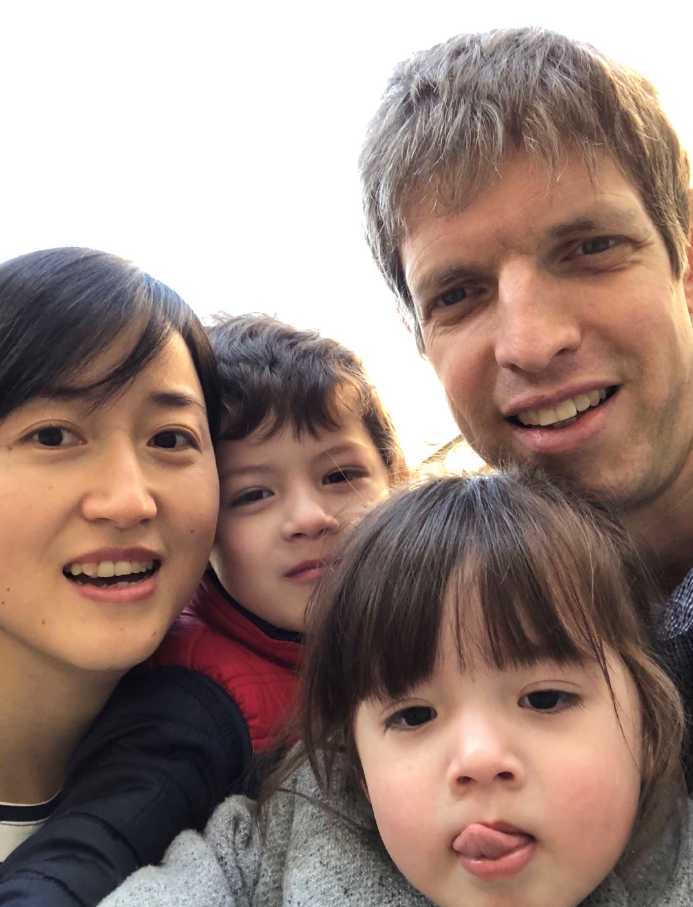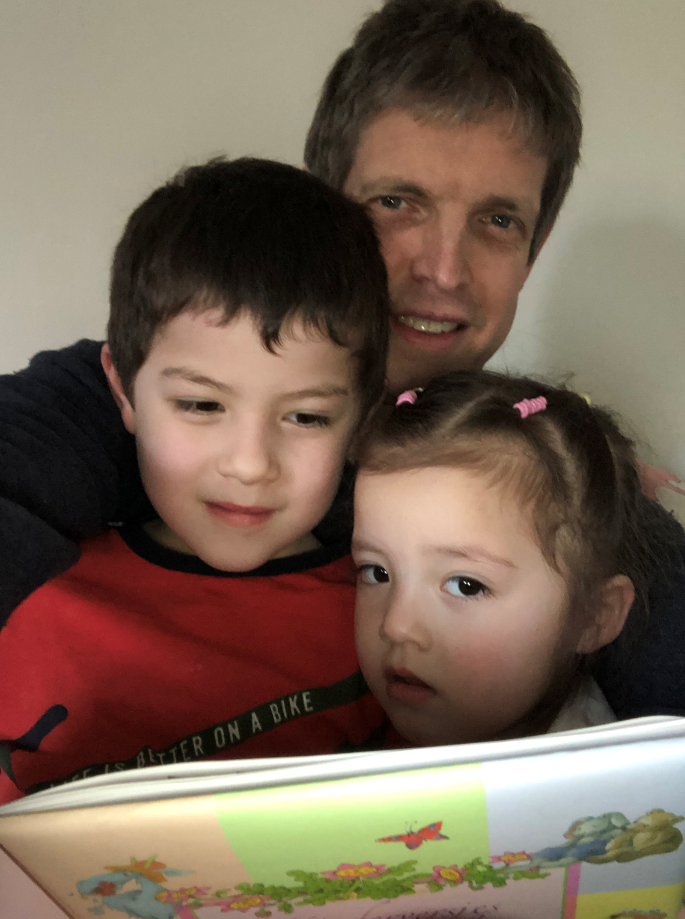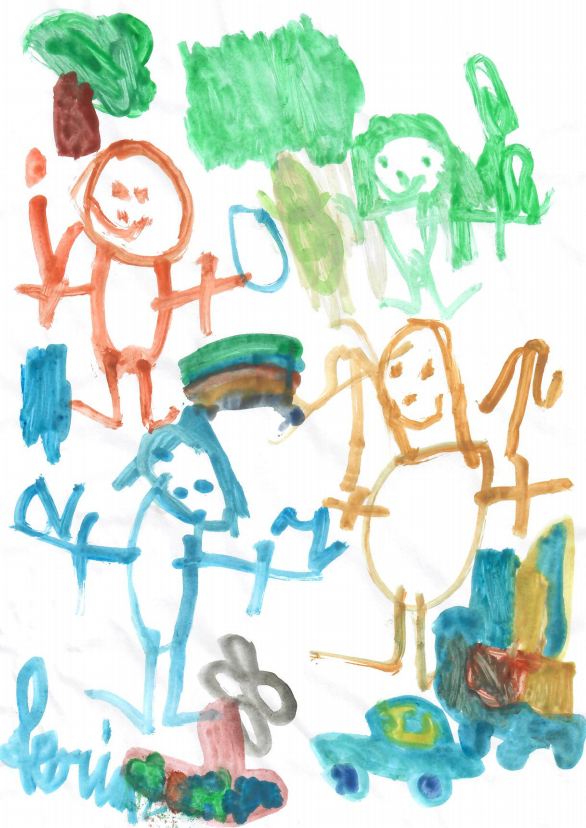During the coronavirus crisis, there are plenty of smart professionals at VUB. But working at VUB is now mainly working for VUB but from home. What’s the reality of the switch from workplace to homeworking? How do we deal with the blurring of boundaries between work and life?
Recognise these situations? We asked our VUB colleagues how they are getting on with the new reality of homeworking. With an eye on best practice, they shared their surprising tips and tricks. Click here to find all their stories.
Gunter Gaublomme
Gunter lives in the green belt around Brussels with his Chinese wife, Connie, and their two children, six-year-old Florian and Sophie, four. His mother is a widow and is currently recovering from a period of illness; she lives by herself in Wetteren. His in-laws live in Shanghai where they have been under coronavirus measures since December. He has worked for VUB for 15 years and is the director of the Brussels Diplomatic Academy.
His homeworking base? Depending on each other’s professional needs, be it a Skype meeting or a deadline, Gunter and Connie work either in seclusion in a separate office or in the living room, close to the children.
Continue the story below the picture.
Quick reactions needed
At the Brussels Diplomatic Academy, students from various countries and with diverse professional backgrounds take courses in economic diplomacy and international business. On 1 April they begin their internship, an important component of their qualification for this academic year. Because of the crisis, some internships have been cancelled: a situation that called for rapid action.
Gunter: “We are doing all we can to ensure our students get an internship in the current academic year. Shortly after the confirmation of the lockdown, various stages were cancelled. I discussed with the internship coordinators at the companies how they could be done via homeworking. In most cases that was fine; for a couple of other students we had to seek alternative internships. Thanks to my broad network of professional contacts at prominent companies and organisations, we succeeded at very short notice. All the internships will be going ahead via homeworking, in accordance with the guidelines.”
Thanks to my broad network of professional contacts at prominent companies and organisations, we succeeded at very short notice.
Keeping spirits up
Gunter’s wife works as a tax specialist for a pharmaceutical company, which quickly obliged any workers who had returned from northern Italy to work at home. For the other staff, her employer also established a system of homeworking. They have recently been adapting to this new situation.
Gunter: “With the outbreak of the coronavirus in China four months ago, and through WhatsApp contact with Connie’s family, we have been aware of the effects of the pandemic for some time. We realise that we will be living together in a much more intensely connected way. We suspect that the children won’t be going back to school this year and we won’t be going back to our workplace. To keep our spirits up, we have family time every evening, like playing games together.”
Coronavirus in your neighbourhood?
On the news and online each day, through images and numbers we learn the state of affairs: those infected, those who have died and those who have recovered in Belgium, in Europe and across the world. You wonder if anyone near you is infected. Sometimes the virus seems far away, sometimes it feels close to home.
Continue the story below the picture.
Gunter: “I live in a rural street in Hoeilaart. Our neighbours are six metres away from us. We learnt that our neighbour was infected with the coronavirus and was in quarantine. He immediately stopped all physical contact, but other than that there have been no special measures imposed on the neighbourhood. We keep in regular contact by phone and have also offered help. Happily, we’ve heard that his recovery is going slowly but steadily.”
Agreements with the children
As parents with professional responsibilities, it’s not easy to be present for your children. Clear arrangements make the difference, as well as fun rewards. Gunter and Connie have found a solution that works for them.
Gunter: “Our children are early risers who wake up between 6.00 and 7.00 each morning, ready to start the day. As much as possible, we stick to a natural and structured daily schedule. From the start, we explained the new situation to them both. That mum and dad have to keep working – from home now – to earn money, and that while they don’t have to go to school, they still have to do their schoolwork. For Florian, who is in primary school, that’s reading and counting. For Sophie, it’s arts and crafts. Luckily, before the lockdown we bought extra painting and craft supplies. Florian understands the situation better than his little sister. He jumps in whenever we aren’t available and we reward him for taking responsibility as the big brother. We finish each day with games like Ganzenbord or Pinguin Panic: it’s our quality time that we all enjoy together.”
Continue the story below the picture.
A time for connection
Gunter and his family are in close contact each day with family in Belgium and China. Facetime with his mother in Wetteren. WhatsApp with the in-laws in China. The worldwide situation is leading to more engagement and the hope of increased humanity.
Gunter: “We also want to offer help to our neighbours, now that the man in quarantine is recovering. I feel lucky to be part of this engagement and consideration for others. But more than that, I’m also curious about the extent to which the political and economic power relations in the world and in Belgium will evolve and change. Professionally, I can’t ignore that.”
Gunter’s tips
- Stay connected and keep caring for each other
“We don’t live alone and we don’t live close to each other. So it’s important to give each other enough attention – daily if necessary. Technology helps us with this in positive ways. A phone call, a WhatsApp message, it’s so easy to do. An offer of help truly helps someone.”
- Make clear – but fun – arrangements with your children, however young they are
“For our children, it’s great to have mum and dad around the whole day. But it’s important to explain to them at their level that mum and dad also have things they need to do, and that they will have to play, read, do crafts independently. But that at the end of each day they will be rewarded when we play games together before bedtime.”
- Accept and put faith in the quarantine period
“It’s important to stick to a natural and structured rhythm and to positively focus on these temporary healing months. The impact of the coronavirus around the world is huge. It will take time and patience to get through it together.”
As much as possible, we stick to a natural and structured daily schedule.
Gunter’s reflections
- “I am curious about how the world will evolve when life returns to normal after the crisis is over. It highlights the limits of globalisation, and you can be sure that certain forces will use this crisis to change the current balance of power.”
- “At first I thought working from home with two small children would be chaotic. But with both parents at home and clear agreements, it works. It’s not always easy, certainly, but still.”
- “I hope that the increased solidarity that has arisen will have a long-lasting impact, and that is won’t suddenly disappear with the virus.”
-
JOIN IN the VUB research. The research group TOR at Vrije Universiteit Brussel and the research bureau hbits are investigating the social consequences of the coronavirus crisis. We’re working in a different way, schools and most shops are closed and public life has ground to a halt. What are the consequences of this for your daily life? Take part in the research and tell us how your daily life has changed via www.dagelijksleven.eu
Read also the article of professor Ignace Glorieux: Life in a time with no fixed times.


